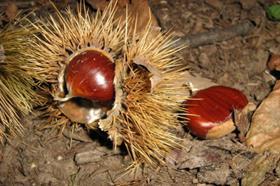
European nut suppliers have raised concerns about the possible threat posed by imports from outside the EU, with Italian chestnut growers in particular lamenting a recent decline in output that, they say, is directly linked to the recent arrival of cheaper Chinese product.
Figures suggest that, since 2005, the volume of chestnuts produced in Italy has fallen dramatically, down 70 per cent at just 18,000 tonnes. A century ago, the crop was over 800,000 tonnes.
As a result, for the first time, the volume of imported chestnuts on the Italian market this year is set to overtake the amount of homegrown produce being sold.
'In 2013, chestnut imports are set to exceed domestic production for the first time,' said Lorenzo Bazzana, economic adviser to the farmers group Coldiretti. 'We are getting the Chinese imports, which have a fainter taste, as well as imports from Turkey, Spain and Portugal,' he added.
'Imports grew by 20 per cent in the first six months of 2013 after having practically doubled in 2012 compared with the previous year and almost tripled against 2010,' explained Lorenzo Bazzana, chief economist at farmers' group Coldiretti.
'The result is we've been overtaken and Italians now have a more than 50 per cent chance of unwittingly having foreign chestnuts on their plate, above all from Spain, Portugal, Turkey and Slovenia.'
The Italians put the reduction down to the spread of the chestnut gall wasp, Dryocosmus kuriphilus, which they say came in with Chinese imports and is now damaging trees.
What's more, Italian officials say they have found proof that Chinese chestnuts are being passed off as Italian in order to command a higher price, posing an existential threat to the real domestic version.
One producer consortium in the country, Castel del Rio, claims to have found 5,000 tonnes of imported nuts carrying its brand, even though its own harvest was just 550 tonnes. 'This is a real fraud,' Bazzana added.
Border control
Meanwhile, agricultural organisation Copa-Cogeca has urged the EU Commission not to relax import controls governing imports of hazelnuts, which they argue risk being contaminated with aflatoxins flooding into the EU from Turkey.
The Commission has said it wants to introduce a new method of monitoring such substances from the end of 2013.
But Copa-Cogeca Secretary-General Pekka Pesonen urged it to keep Turkish hazelnuts on the list of countries and products that are subject to 'stringent' import requirements.
'We oppose the Commission's proposal to diminish its effectiveness by introducing random import controls and low-risk analysis since consignments of hazelnuts are still being intercepted at borders contaminated with aflatoxins,' he wrote in a letter to the Commission.'
According to Copa-Cogeca, 90 per cent of the EU's hazelnut imports come from Turkey.



